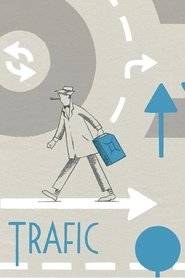Hulot's car is, fittingly, a modified version of the French classic, the Renault 4L. And perhaps I missed it, but I don't think they even removed that steak from its radiator grille…
The usual French term for traffic—meaning the movement of motor vehicles—is la circulation. The word trafic can be a synonym for it, but its primary meaning is traffic in the sense of commerce, the exchange of goods. Jacques Tati’s use of the word for his 1971 panorama of car culture is pointed: it is an example of the same ironic franglais he used in calling his previous film Playtime. Linguistic cosmopolitanism in the Babel-like world of commerce and culture is one of Trafic’s several satirical targets.[…]
Tati’s story of failed transportation might be seen as a parodic variation on Henri-Georges Clouzot’s The Wages of Fear (1953), about the moving of a cargo of explosives—except that in Trafic the world itself, rather than the cargo, is explosive.
[…]
Echoing Playtime, the film’s dialogue is a polyphony of languages—here French, Dutch, Flemish, and English. [And] this is only counting human sounds: the roar of motors, screech of brakes, and clatter of car doors is no less autonomous and meaningful a language than those of words.
[…]
Trafic is not consistently funny, its humor drawn out or diffuse to the point of near abstraction. Its real comedy lies less in jokes than in the accumulation of polyphony and simultaneous incident, and in the offhand touches that serve as punctuation.
— Jonathan Romney (Criterion)
— Jonathan Rosenbaum (Criterion)
Synopsis: Mr. Hulot is the head designer of the Altra Automotive Co. His latest invention is a newfangled camper car loaded with outrageous extra features. Along with the company's manager and publicity model, Hulot sets out from Paris with the intention of debuting the car at the annual auto show in Amsterdam. The going isn't easy, however, and the group encounters an increasingly bizarre series of hurdles and setbacks en route.

